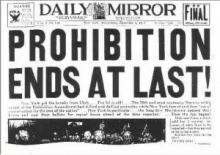I was on a road trip to the Grand Canyon, Las Vegas, and Tiajuana. There was only one problem during the entire nine-day spring break trip: Utah. It was much more beautiful than any of of our four-person group had anticipated and it had been taken over by the Mormons. Which meant one thing only: no booze.
To spit in the face of Joseph Smith when we entered the state, we all lit up cigarettes. Joseph Smith fought back from beyond the grave and at least one of the cigarette tips came flying back inside the Honda and burned the backseat.
We stayed in Utah one night and didn’t drink a thing.
Utah liquor laws have loosened up a bit since that time, but are still more than a tad bit strange. According to a recent NYT article, restaurants can serve alcohol, but there are a few unusual conditions. Any bar must be known as a restaurant and any restaurant serving alcohol must hide the alcohol until the patrons are actually drinking the booze. No bottles above the bars, and no bartenders lurking behind the counter waiting for customers to order some more booze.
Prior to the recent changes in Utah’s liquor laws, anyone who wanted to drink at a bar or restaurant had to pay a membership fee, ostensibly to be part of a liquor club. The changes have benefited Utah’s drinking scene considerably as many bars (I mean “restaurants”) have thrived since the law was enacted. Happy hours aren’t allowed, but before you get too bummed out about the changes in that law, think about this: Utah actually has all-day drink specials as a way to get around the happy hour prohibition.
Getting a liquor license in Utah is no easy task, but that is unlikely to change any time soon. An article that I didn’t quite understand discussed that Utah legislators will the important issue of booze in a special session of the legislature. Specifically, the Utah state legislature will:
clarify that liquor commissioners and employees of the state's liquor agency cannot have direct conflicts of interest but only incidental conflicts, such as attending a church licensed to serve sacramental wine.
My difficulty understanding this quote doesn’t stem from the language itself, but the differences in background. It would seem that prior to this change, anyone who drinks alcohol at church would have had a conflict of interest in serving on the Liquor Board. That sort of dialog would not take place in most states.
